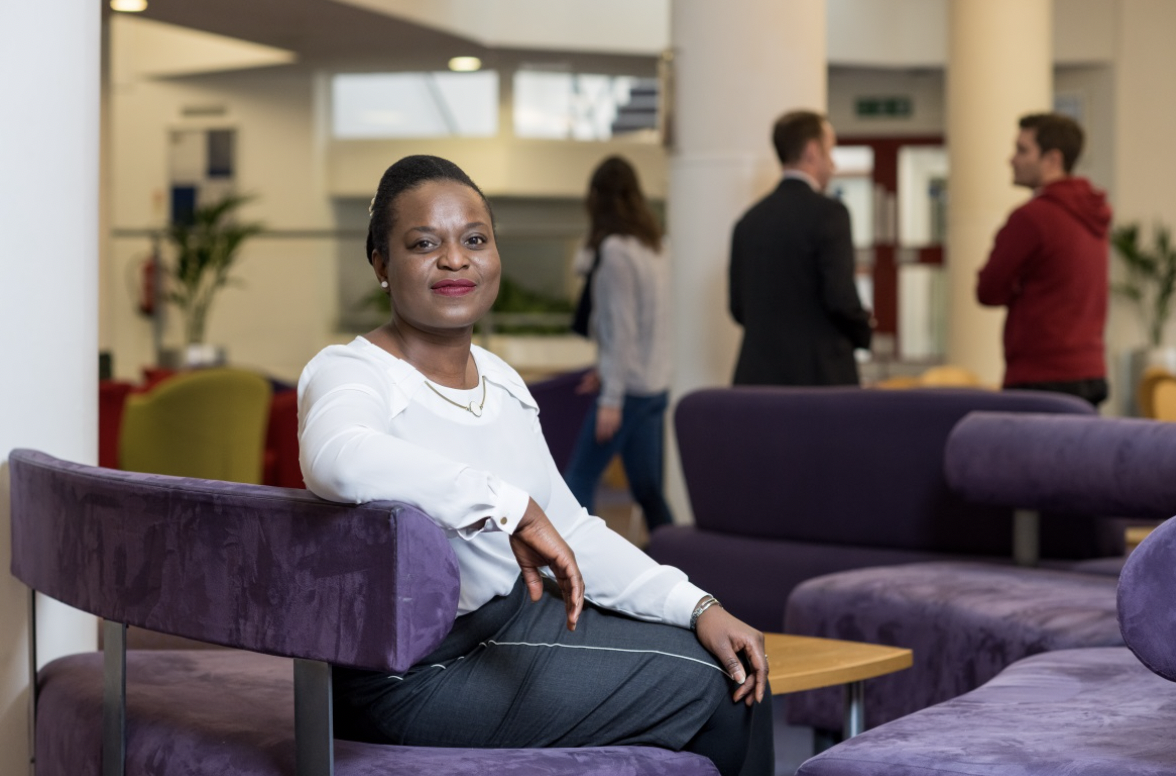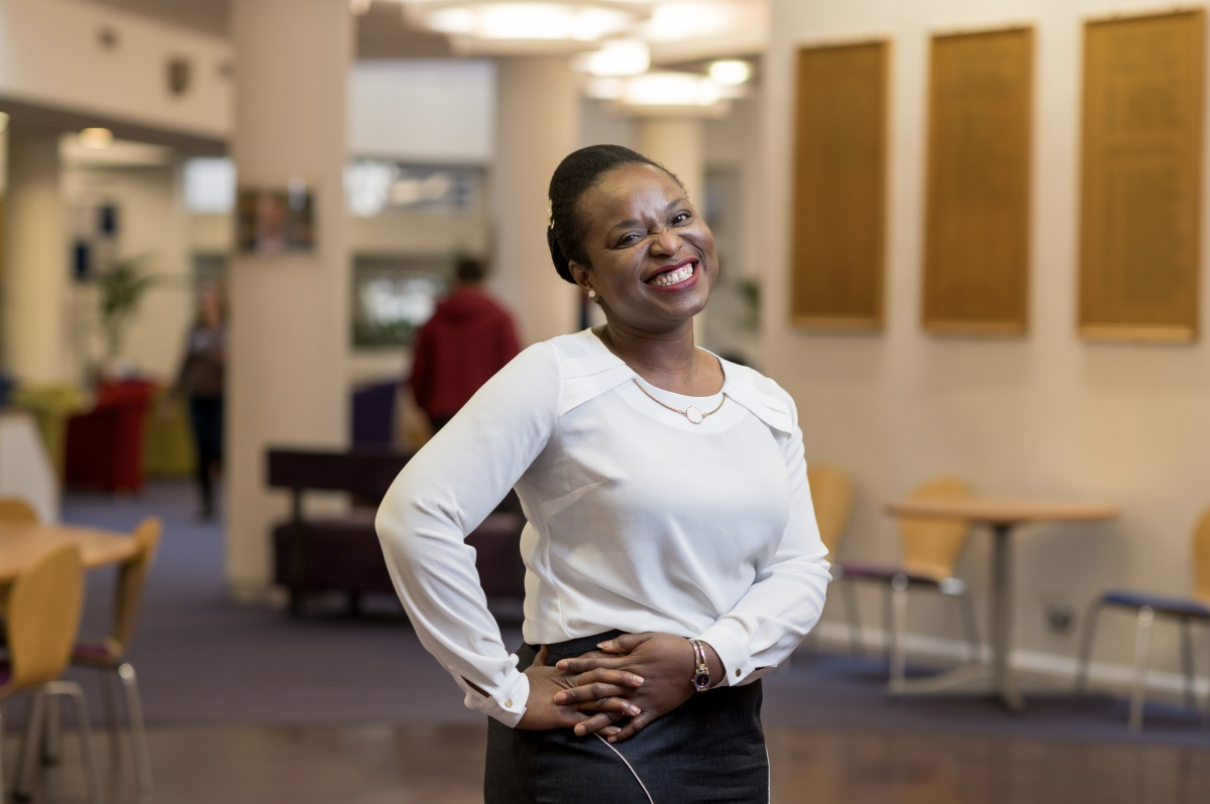A sit down with Doyin Atewologun.
22/07/2019

Tackling discrimination in society; The Gender, Leadership and Inclusion Centre.
What are the biggest challenges when we think of Gender, Leadership and Inclusion within organisations?
“The expression that comes to mind I think of this challenge is ‘Privilege is invisible to those who have it’.
“I think one issue we have to grapple with is that a lot of the discrimination that occurs in organisations or, actually, in society has changed form. A lot of people would agree broadly speaking that yes, everybody should have the chance to rise to the top if that’s what they want. One of the challenges we find today is that people aren’t blatantly saying ‘I’m not going to give you this job because you’re a working mother, because you look like you’re Muslim, because you sound funny’. People aren’t saying that but a lot of our behaviours are sub-consciously giving out those messages. So because the discrimination is not so blatant it is under experienced, undervalued and therefore under resourced…we need to make it explicit that these things are still there.
The second challenge is that even if organisational leaders believe we should try and work towards fairness and equality, they might see it as someone else’s problem (e.g. HR, or under-represented people themselves). Many leaders in our businesses have not had to really think about what it means to be structurally disadvantaged and the impact on careers, on performance – they’re busy getting on with their everyday work. In order for an organisation to make true equity happen, everybody needs to be checking in and bought into it.”
Tell us about the PhD you obtained at the Cranfield School of Management.
“I was interested in leadership and what it means to be a leader, In particularly I was interested in being a leader if you’re not the kind of leader people expect you to be, so the concept in the literature is non-prototypical leadership. A common example is; think manager think male, think leader think male, think doctor think male, so in particular I was interested in how people in that position (e.g. leader, but not male, or white) see themselves, what it means for them to be them, to be non-prototypical leaders. In order to investigate that I worked with people who are leaders who also happen to be black, Asian, minority, ethnic women and men. I asked them to keep diaries of everyday events that just made them think about themselves as leaders, so I was interested in their identities as non-typical leaders.”
Can you tell us about some of those diary entries?
“I found that quite frequently, perhaps once a week, things happen in the working environment that prompt people to think about themselves as minority leaders – but encouragingly, these weren’t always negative experiences – many of these were positive, affirming, for example when they noticed no one else looked like them in the executive team and were proud of their achievements, or when they came across more junior colleagues that looked like them and reminded themselves they were role models.”

What was your route to academia after obtaining your PhD?
“Before my PhD I worked as a business psychology and leadership consultant, and then became curious about different types of leaders. My PhD really made clear to me that there was work required when we think about what leadership means and what it means to be an authentic leader even when you’re different. So yes there are some potential tensions but also lots of wonderful opportunities to connect with people in a different way and also think through what your own unique value as a leader is. So my PhD really got me thinking about different types of leadership and helping organisations figure out what need to do to make sure that people come into their own as different types of leaders, and encouraging organisations to create those inclusive spaces that make people feel that they can be both different and belong.
After my PhD I had the option of going back to being a leadership consultant. But I had such a positive experience at Cranfield. It was the best decision I had made to do my PhD here, and if anybody had asked me before I had started my PhD whether I was going to stay in academia I would have said no, and that I was just interested in this particular subject and once I study it then I’m done. Here I am ten years later. It just became clear that there was value in continuing the research whilst also working with organisations.”
Tell us about the inclusive talent management strategy you are working on with the NHS.
“We know that the NHS needs to be more efficient than it currently is, especially given today’s significant budgetary cuts; it needs to be efficient in how it manages talent too. I am working with a group of talent experts and leaders across the NHS system that have the ambition to ‘future proof’ the NHS, to ready the NHS by thinking about talent identification and talent development for today’s NHS and the NHS of the future, which will continue to be a very diverse one.
We know from the research there is a link between positive patient outcomes and leadership that is diverse, inclusive and compassionate. I am working with Regional Talent Boards to get the NHS to a point where if they need to appoint a new Director in the NHS, we can be confident that we have identified the best and most diverse possible pool of leaders available, selected them in the most fair and open way, identified that they have the ability to lead within the NHS system and they are inclusive leaders, that is, they get the best out of all the different types of people who work with them.”.
What does a typical day at Cranfield look like for you?
“Sometimes I might be teaching an MBA class, other times I might be meeting a client about an inclusive talent management offering that we have, I may be designing a cutting-edge programme with colleagues to incorporate the latest thinking about reducing unconscious bias in their workforce, helping them think through their line managers capability to be inclusive leaders or I might be reading and giving feedback to PhD students’ work while trying to finish a paper on multiple identities for an international peer reviewed journal.”
What do you like the most about working at Cranfield?
“What I love about Cranfield is that it really marries that knowledge into action piece, it lives it, it breathes it. There is always a sense that through ongoing conversations with government, with industry, with research students, you continue to blend your theory and thinking with your practice; this affirms that the theoretical work you’re doing has impact, but also the practical work you’re doing is evidence based. That duality is really powerful.”
Categories & Tags:
Leave a comment on this post:
You might also like…
Keren Tuv: My Cranfield experience studying Renewable Energy
Hello, my name is Keren, I am from London, UK, and I am studying Renewable Energy MSc. My journey to discovering Cranfield University began when I first decided to return to academia to pursue ...
3D Metal Manufacturing in space: A look into the future
David Rico Sierra, Research Fellow in Additive Manufacturing, was recently involved in an exciting project to manufacture parts using 3D printers in space. Here he reflects on his time working with Airbus in Toulouse… ...
A Legacy of Courage: From India to Britain, Three Generations Find Their Home
My story begins with my grandfather, who plucked up the courage to travel aboard at the age of 22 and start a new life in the UK. I don’t think he would have thought that ...
Cranfield to JLR: mastering mechatronics for a dream career
My name is Jerin Tom, and in 2023 I graduated from Cranfield with an MSc in Automotive Mechatronics. Originally from India, I've always been fascinated by the world of automobiles. Why Cranfield and the ...
Bringing the vision of advanced air mobility closer to reality
Experts at Cranfield University led by Professor Antonios Tsourdos, Head of the Autonomous and Cyber-Physical Systems Centre, are part of the Air Mobility Ecosystem Consortium (AMEC), which aims to demonstrate the commercial and operational ...
Using grey literature in your research: A short guide
As you research and write your thesis, you might come across, or be looking for, ‘grey literature’. This is quite simply material that is either unpublished, or published but not in a commercial form. Types ...






